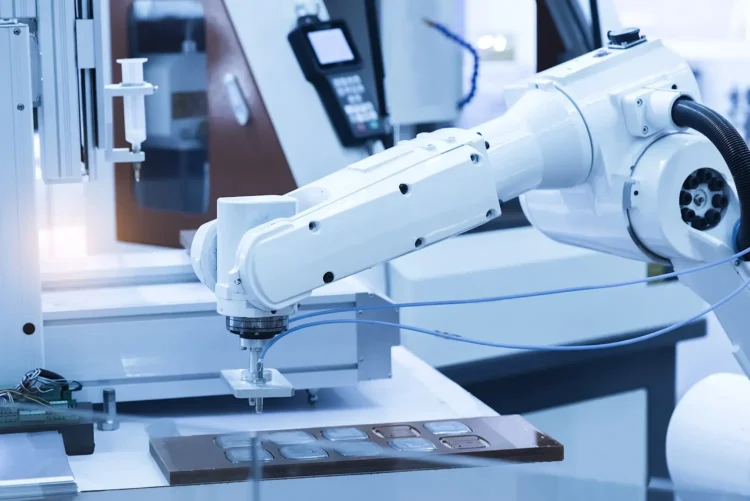♦Robotics and factory automation move fast, and rapid prototyping is no longer a luxury-it is the quickest road to products that can hit shelves. Central to most winning prototypes are custom machined aluminum parts, because the metal brings a rare mix of strength, lightness, toughness, and ease of cutting. As teams push to release ideas faster, precision machining suppliers now play key roles in changing sketches into working, high-performance robots.
In the sections below we explain why aluminum keeps winning the prototyping vote in these fields, how tailor-made machining fuels each cycle of innovation, and the smart ways B2B builders can team up with shops to gain speed without dropping quality.
Prototyping Takes Off in Robotics and Automation
Building prototypes for robots is not only about checking if a shape looks good-it is also about fine-tuning function, speed, and the way users touch and control the system. A hold-up in turning out a test unit for an automated product can freeze the whole launch plan and give rivals extra breathing room.
That is why rapid prototyping must clear several key hurdles:
- Mechanical validation: Prototypes must bear real loads and repeat motions to show they will not bend, crack, or wear in service.
- Integration testing: Every bracket, frame, and panel needs to mesh perfectly with wires, sensors, and motors so nothing clashes when the final build starts.
- Iteration: Push out fast revisions by updating designs whenever testers speak up or results roll in.
- Investor confidence: Show working prototypes to backers and lock in funding or teaming deals.
That rapid back-and-forth is where custom machined aluminum parts really shine. Aluminum cuts cleanly into tough shapes yet keeps its strength, so it proves itself on the shop floor and out in the field.
Why Aluminum Is the Top Pick for Robot Prototypes
Aluminum brings a short list of traits that fit prototype builders like a glove:
- Lightweight strength: Good alloys stay stiff and strong while weighing far less than steel.
- Excellent machinability: CNC tools eat through it fast, wear slowly, and leave a mirror finish.
- Corrosion resistance: It shrugs off rust and decay both indoors and in damp, sunny outdoor spots.
- Thermal and electrical conductivity: Handy when parts sit beside hot circuits or need to shed static.
- Recyclability: Brought back to raw stock without losing quality, so every build cuts waste.
Because of these perks, designers in robotics and beyond now order custom machined aluminum parts early for joints, grippers, frames, sensor arms, and a lot more.
What High-Precision Parts Machining Shops Can Really Do
When a prototype is put through its first test, every single part has to fit just right. That rule matters even more when motors, sensors, or lasers are moving fast or working together. High-precision parts machining shops offer a short list of services that keep robot projects on track:
- 5-axis CNC machining: Cuts tricky shapes in one spin of the table, so there is less room for mistake and less waiting.
- Low-volume production: Turns out 1 to 100 parts at a time without billing like a mass run.
- Design for Manufacturability (DFM) feedback: Shows engineers where small tweaks can shave hours off the mill and dollars off the bill.
- Rapid lead times: Some shops can ship overnight to keep an aggressive lab schedule.
- Material expertise: Guides users on which aluminum grade-6061, 7075, or something else-delivers the right mix of weight, stiffness, and finish.
The bond between precision machining suppliers and robot builders is a deal maker. One bad cut can ripple through software tests and ruin a months-long study.
Where Custom Machined Aluminum Fits in Robotic Gear
Engineers turn to custom aluminum parts because the metal is light, tough, and easy to shape. That blend works well in many hot spots, including:
- End-of-arm tooling (EOAT): Grippers and quick fingers that need muscle but can’t drag extra weight.
- Rotary and linear joints: Super-tight bearings that keep movement smooth and need room-ruled precision.
- Sensor mounts: Cozy shells for LIDAR, cameras, and force sensors squeezed into narrow spots.
- Motor and actuator cans: Light-but-solid aluminum cools hot parts and carries load at the same time.
- Test rigs: Custom clamps and jigs that let engineers push buttons, watch data, and tweak code fast.
Across these tasks, made-to-order aluminum bits and quick prototype loops speed ideas to the lab while keeping real-world performance.
What to Watch When Machining Aluminum for Robots
Aluminum cuts easier than steel, yet it still throws curve balls:
- Chip cling: Silvery curls stick to knives, so steady coolant and fast vac help keep blades clear.
- Heat stretch: Certain alloys swell as they warm, so layouts must account for the extra millimeter.
- Finish work: Anodize, blast, or powder coat adds life and, frankly, makes parts look less boring.
Savvy precision-machining shops tame these headaches with special tools, clear run charts, and tidy finishes so prototypes meet the spec and the eye.
Speed, Flexibility, and Supplier Collaboration in B2B Prototyping
Pressure to get products out the door fast is pushing B2B companies to automate everywhere they can. Because of that, picking the right machine shop can speed or stall the whole development plan. Look for these qualities when you screen suppliers:
- Quick quotes: Easy online forms that cut the endless emails and phone calls.
- Real-time order tracking: lets the R&D team check status, set deadlines, and avoid surprises.
- Design check-ins: Some shops assign engineers who review your CAD files early to catch tricky steps.
- Built-in assembly help: Useful when machined parts must slot smoothly with off-the-shelf sensors or boards.
Services like these matter most in fast-moving markets such as robotics, where tests, tweaks, and mass runs need to line up without gaps.
Sustainability and the Long-Term Role of Aluminum in Automation
Automation itself is part of the green-factory trend, and aluminum fits right in. The metal is easy to recycle and leaves a smaller carbon footprint over its life, so it keeps prototypes-and the planet-looking good.
These days, many B2B companies ask their suppliers for:
- Material traceability to know where every part came from;
- Recycled aluminum content as part of their green policy;
- Energy-efficient machining practices to cut waste and costs.
Finding high precision parts machining suppliers who meet these needs can boost a firm’s eco-score and drive smarter, cleaner innovation.
Conclusion
In robotics and factory automation, nailing the prototype often seals the deal on the entire project. Custom machined aluminum parts deliver the sturdy, exact test beds engineers need to tweak ideas quickly and cheaply. With those parts in hand, designers can sketch with confidence, secure in the knowledge that the metal will behave as it should once the robot starts moving.
To unlock the full power of aluminum, B2B pioneers should build tight partnerships with high-precision machining suppliers who offer solid know-how, fast turnarounds, and open, team-minded guidance at every stage.
As smart machines grow faster, more flexible, and greener, custom aluminum machining stops being just a shop step-it becomes a key driver of tomorrow’s engineering.





